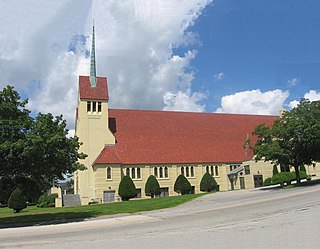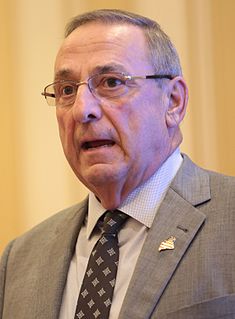
Androscoggin County is a county in the U.S. state of Maine. As of the 2010 census, the county's population was 107,702. Its county seat is Auburn.

Auburn is a small city in south-central Maine within the United States. The city serves as the county seat of Androscoggin County. The population was 23,055 at the 2010 census. Auburn and its sister city Lewiston are known locally as the Twin Cities or Lewiston–Auburn (L–A).

Lewiston is the second largest city in Maine and the most central city in Androscoggin County. The city lies halfway between Augusta, the state's capital, and Portland, the state's most populous city. It is one-half of the Lewiston-Auburn Metropolitan Statistical Area, commonly referred to as "L/A." or "L-A." Lewiston exerts a significant impact upon the diversity, religious variety, commerce, education, and economic power of Maine. It is known for a relatively low cost of living, substantial access to medical care, and a relatively low violent-crime rate. In recent years, the City of Lewiston has also seen a spike in economic and social growth. While the dominant language spoken in the city is English, it is home to the largest French-speaking population in the United States while it is second to St. Martin Parish, Louisiana, in percentage of speakers.

Angus Stanley King Jr. is an American politician and attorney serving as the junior United States Senator from Maine since 2013. A political independent since 1993, he was the 72nd Governor of Maine from 1995 to 2003.

The University of Southern Maine (USM) is a public university with campuses in Portland, Gorham and Lewiston in the U.S. state of Maine. It is part of the University of Maine System. It was founded as two separate state universities, Gorham Normal School and University of Maine at Portland. The two universities were combined in 1970 to help streamline the public university system in Maine and eventually expanded by adding the Lewiston campus in 1988.
The Maine Public Broadcasting Network is a state network of public television and radio stations located in the state of Maine in the United States. It is operated by the Maine Public Broadcasting Corporation, which holds the licenses for all the Public Broadcasting Service (PBS) and National Public Radio (NPR) stations licensed in the state. MPBN has studios and offices in Portland, Lewiston and Bangor.

The Howard C. Reiche Community School is a K–5 elementary school in the West End of Portland, Maine. Currently there is no principal.
Somalis in the United Kingdom include British citizens and residents born in or with ancestors from Somalia. It is thought that the United Kingdom (UK) is home to the largest Somali community in Europe, with an estimated 108,000 Somali-born immigrants residing in the UK in 2018 according to the Office for National Statistics. The majority of these live in England, with the largest number found in London. Smaller Somali communities exist in Birmingham, Bristol, Manchester, Liverpool, Leicester, Milton Keynes, Sheffield and Cardiff.
The Letter: An American Town and the 'Somali Invasion' is a 2003 documentary directed by Ziad Hamzeh. It was filmed in the town of Lewiston, Maine.
The history of the area comprising the U.S. state of Maine spans thousands of years, measured from the earliest human settlement, or less than two hundred, measured from the advent of U.S. statehood in 1820. The present article will concentrate on the period of European contact and after.
The Somali diaspora refers to expatriate Somalis who reside in areas of the world that have traditionally not been inhabited by their ethnic group. The civil war in Somalia greatly increased the size of the Somali diaspora, as many Somalis moved from Greater Somalia primarily to the Arabian peninsula, Europe, North America, Southern Africa and Australia. There are also small Somali populations in other pockets of Europe and Asia.
The Somali Bantu are a Niger-Congo-origin ethnic minority group in Somalia who primarily reside in the southern part of the country, primarily near the Juba and Shabelle rivers. They are descendants of people from various Bantu ethnic groups, who were acquisitioned from Southeast Africa and sold into slavery in Somalia and other areas in Northeast Africa, and West Asia as part of the Arab slave trade. Somali Bantus are ethnically and physically distinct from indigenous Somalis of Cushitic descent, and they have remained marginalized ever since their arrival in Somalia.In 1991, 12,000 Bantu people were displaced into Kenya, and nearly 3,300 were estimated to have returned to Tanzania.
Internal migration or domestic migration is human migration within one geopolitical entity, usually a nation-state. Internal migration tends to be travel for education and for economic improvement or because of a natural disaster or civil disturbance. Cross-border migration often occurs for political or economic reasons. A general trend of movement from rural to urban areas, in a process described as urbanization, has also produced a form of internal migration.
The Bantus are an ethnic group from Somalia. A significant community of them reside in Maine; as of 2012, there were around 1,000 in Lewiston.
Charlotte Agell; a Swedish-born American; was born in 1959. Agell is an author for young adults and children who currently lives in Maine. Her second novel; Shift; was featured on the front cover of the Brunswick Times Record in October 2008. In addition to working on novels and children's books, Charlotte Agell also teaches in Maine.

Paul Richard LePage is an American businessman and politician who was the 74th Governor of Maine, from 2011 to 2019. A member of the Republican Party, LePage served two terms as a city councilor in Waterville, Maine, before being elected Mayor of Waterville in 2003, serving until 2011.

The 2011 Portland, Maine mayoral election took place on November 8, 2011.
Although the Ku Klux Klan is most often associated with white supremacy, the revived Klan of the 1920s was also anti-Catholic. In the U.S. state of Maine, with a negligible African-American population but a burgeoning number of French-Canadian and Irish immigrants, the Klan revival of the 1920s was mainly a Protestant nativist movement directed against the Catholic minority. For a period in the mid-1920s, the Klan captured elements of the Maine Republican Party, even helping to elect a governor, Owen Brewster.
Safiya Said Khalid is an American politician from Lewiston, Maine. Khalid is the first Somali-American and youngest person ever elected to serve at the city council in Lewiston, Maine.










